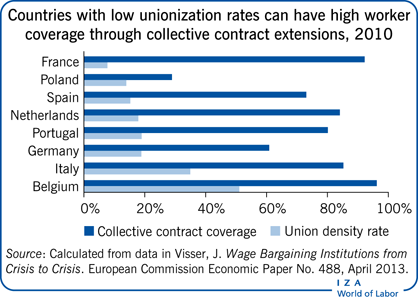Elevator pitch
In many countries, the wage floors and working conditions set in collective contracts negotiated by a subset of employers and unions are subsequently extended to all employees in an industry. Those extensions ensure common working conditions within the industry, mitigate wage inequality, and reduce gender wage gaps. However, little is known about the so-called bite of collective contracts and whether they limit wage adjustments for all workers. Evidence suggests that collective contract benefits come at the cost of reduced employment levels, though typically only for workers earning close to the wage floors.

Key findings
Pros
The extension of collective contract provisions reduces wage inequality by setting occupation-specific minimum wages within an industry.
Collective contract extensions reduce gender wage gaps, mainly at the bottom of the wage distribution.
Collective contract extensions provide job stayers with partial insurance against transitory productivity fluctuations or economy-wide fluctuations associated with the business cycle.
In the absence of full mobility across jobs, collective contract extensions avoid opportunistic cuts in job quality and wages.
Cons
Sector-wide minimum wages increase labor costs to all covered firms, inhibiting employment growth.
Collective contract extensions impose working conditions on employers and employees who did not participate in the bargaining process.
Extending collective contracts reduces competition by deterring firm entry and small business creation.
Collective contract extensions introduce wage rigidities among workers close to wage floors, which may limit the ability of firms to adapt to economic shocks.